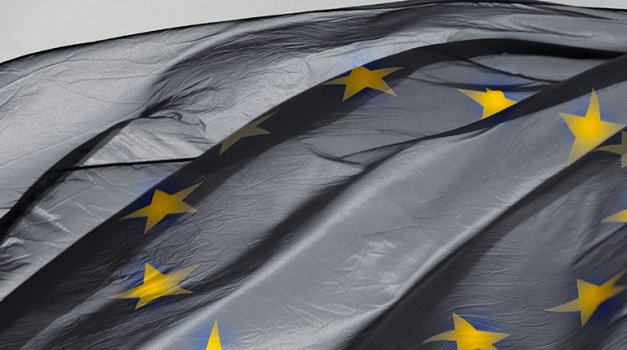The EU flag is just a rag in the wind
The parallels between Ukraine now and Bosnia in 1992 are obvious...

Jorge Luis Borges once said that a true gentleman is interested in lost causes only. If you're looking for a decent contemporary lost cause, you will surely find it in Ukraine, since if it comes to war, no matter who wins, most of the ordinary people will be losers.
We, the citizens of Bosnia, can tell you a thing or two about being losers. It was April 1992, during the start of Sarajevo's siege. I was a long-haired teenager, dressed in blue jeans and a shirt with the famous black and white "Unknown Pleasures" print. From the window of my suburban flat, I was watching the Yugoslav People Army's cannons, located in the Lukavica army camp, firing projectiles on Sarajevo. That army was controlled by Slobodan Milošević, the president of Serbia.
The National Radio was broadcasting Bosnian president Alija Izetbegović's discussion with Yugoslav army general Milutin Kukanjac. Izetbegovic asked the army to stop the bombing. Kukanjac claimed that not a single shot was fired from his army positions. I remember like it was yesterday that my glass of milk was jumping on the table to the rhythm of cannonballs "not fired" on Sarajevo.
When common people find themselves in the middle of a geopolitical storm – as the citizens of Ukraine do now, or my family back then in Bosnia – the dilemma "is this glass half empty or half full?" is irrelevant: soon, it will be broken.
The people in Bosnia were so full of optimism during the first days, even months, of war. Neighbours were saying that the west would never allow it to happen because "we are Europe". My aunt went to Belgrade, but refused to take her money from a Sarajevo bank. It will be over in a week; we'll be back soon, she said. President Izetbegovic, in his TV address to the people, said: "Sleep peacefully: there will be no war."
Well, we woke up after a four-year nightmare.
Now, the events in Ukraine seem to us Bosnians like a terrifying deja vu. The parallels between Ukraine now and Bosnia in 1992 are obvious. The Russian army acted aggressively towards Ukraine, as Milošević's army did in Bosnia. Putin had strong support in parts of Ukraine, as Milošević had in large parts of Bosnia and Herzegovina. Now Kiev has the support of the EU and the US, as Sarajevo did. We even had Bono and Pavarotti singing about Miss Sarajevo. Yet all the musical telegrams of support from the free world didn't stop the ethnic cleansing in eastern Bosnia, close to the Serbian border.
Behind the bloody curtain of Bosnian and other Balkan wars, the transition from the Yugoslav version of socialism to capitalism took place, managed by the EU troika. Behind the ballet of masses on Kiev squares and Russian army manoeuvres, there is a clear economic logic. Brussels asked Kiev to sign a free-trade pact with the EU. That was a good deal for EU, but clearly not for Ukraine. Then, Moscow offered Kiev a helping hand, with all the strings in the world attached: £9bn of aid, a reduction of gas prices by 30% and major business deals for the Ukrainian industry. Then Viktor Yanukovych declined the European offer. And the Euro-Maidan movement rose...
As the economist Michael Roberts notes, "the people of Ukraine are left with Hobson's choice: either go with KGB-led crony capitalism from Russia or go with equally corrupt pro-European 'democrats'".
Roberts predicts that Ukraine's foreign debt is about to double, "as it takes on new debt from the IMF and the cost of existing dollar and euro-debt jumps as the hryvnia is devalued". It hardly comes as a surprise to us in former Yugoslavia. At the beginning of its dissolution, the Yugoslav foreign debt was £9.5bn; today, after all the "help" we got from the troika, it's more than £107bn.
In their struggle to overcome Russian occupation and survive all the Trojan horses from the institutions of global capitalism, it is to be hoped that people in Ukraine learned a thing from the war in Bosnia – that a deus ex machina from the west will never land, solving the situation and leading them into the promised land of the EU.
Bosnia today is a poor and divided country, even more so than it was back in 1992. Former soldiers, hungry and sick, are gathering and protesting. "While we were bleeding, they were stealing," says one. In the past, they were ready to die for their nation and its bright future. Some Bosnians saw their future under the Bosnian and EU flag, others under the Croatian and EU flag, and others still under the flag of The Great Serbia. Lots of flags, but only one poverty for all.
Now they know: the flag is just a rag in the wind. And yes, the only true gentlemen are always the losers.
The Guardian
Udruga građana FALIŠ | IBAN: HR9823900011199009772 HPB DD ZAGREB
Predsjednica Matilda Dulibić | Glavni urednik: Emir Imamović Pirke
Uredništvo: Kruno Lokotar, Emir Imamović Pirke
Adresa: Nikole Tesle 1, Šibenik | Kontakt: info@falis.com.hr
Copyright © 2024 www.falis.com.hr | Dizajn: Ante Filipović Grčić (2FG) | Programiranje: MEDIAN kreativna rješanja


